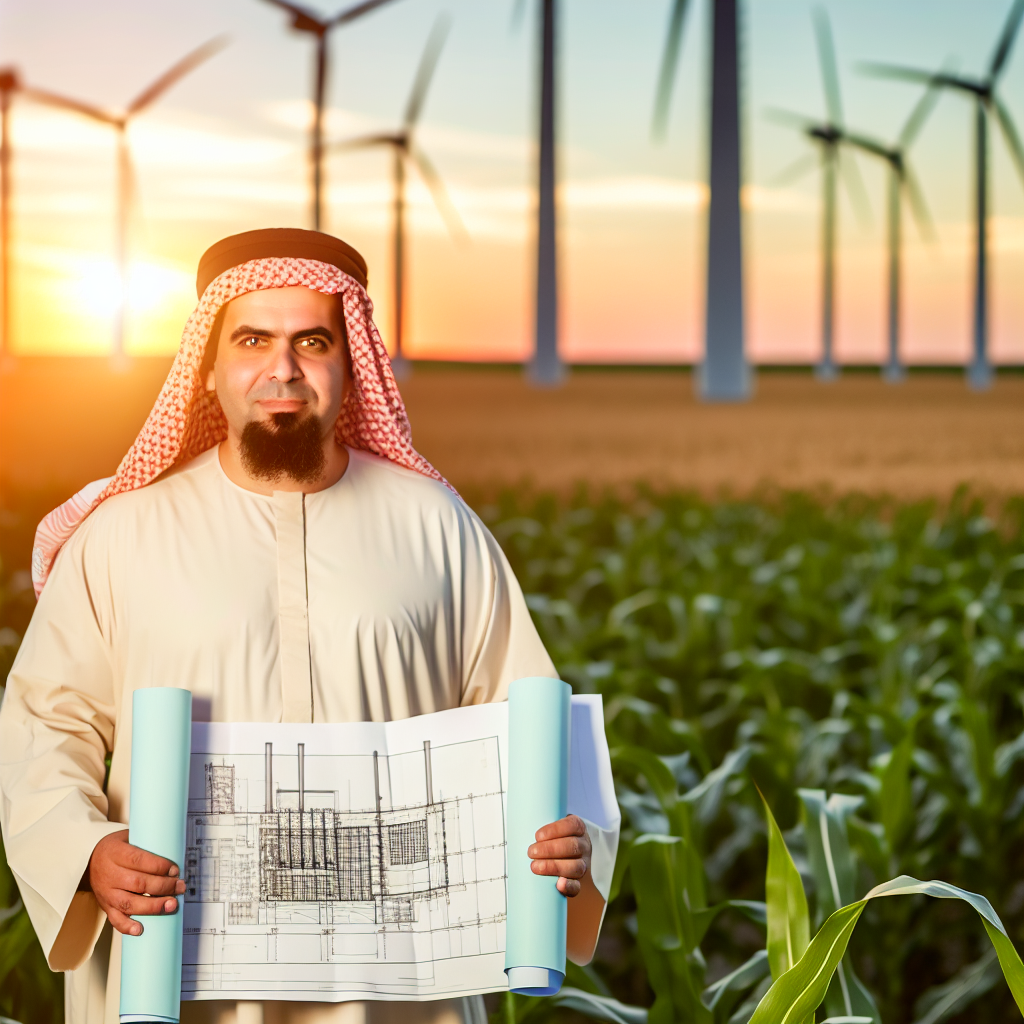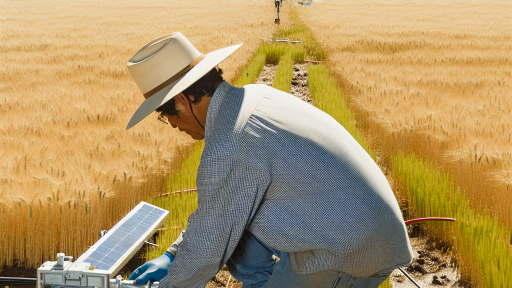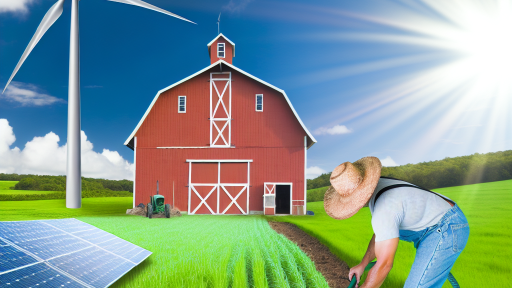Overview of Renewable Energy Sources in Agriculture
Solar Energy
Solar energy is a powerful resource for agriculture.
Farmers can utilize solar panels to harness sunlight.
Many operations use solar to power irrigation systems.
This reduces reliance on traditional energy sources.
Wind Energy
Wind energy provides another viable option.
Farmers can install wind turbines on their land.
These turbines generate electricity for on-site use.
In some cases, they can also sell excess energy.
Biomass Energy
Biomass energy utilizes organic materials for fuel.
Farmers can convert agricultural waste into energy.
This process reduces waste while generating power.
Moreover, it contributes to a circular economy.
Geothermal Energy
Geothermal energy taps into the Earth’s heat.
It can efficiently heat greenhouses and livestock facilities.
This method provides reliable temperature control year-round.
Transform Your Agribusiness
Unlock your farm's potential with expert advice tailored to your needs. Get actionable steps that drive real results.
Get StartedConsequently, it enhances crop yields and animal health.
Hydropower
Hydropower leverages flowing water for energy production.
Farmers near rivers can utilize small-scale hydropower systems.
This approach helps in reducing energy costs significantly.
It also minimizes the environmental impact associated with energy production.
Benefits of Transitioning to Renewable Energy for Farmers
Cost Savings
Switching to renewable energy significantly reduces energy costs.
Farmers can save money on utility bills over time.
Solar panels have low maintenance costs and last for decades.
Additionally, wind energy can provide savings in remote locations.
Increased Sustainability
Renewable energy sources decrease reliance on fossil fuels.
They help minimize greenhouse gas emissions.
Farmers can contribute positively to the environment.
Moreover, sustainable practices can lead to better soil health.
Energy Independence
Adopting renewable energy enhances energy independence for farmers.
On-site energy production reduces vulnerability to market fluctuations.
Farmers can control their energy sources and costs.
This independence fosters greater financial stability.
Innovative Solutions
Renewable energy technologies encourage innovation in agricultural practices.
Farmers can adopt new techniques to enhance productivity.
For example, precision agriculture often pairs well with renewable tech.
Utilizing innovation helps farmers stay competitive in the market.
Government Incentives
Many governments offer incentives for renewable energy adoption.
Farmers can benefit from tax credits and grants for installations.
These incentives can significantly offset initial costs.
Showcase Your Farming Business
Publish your professional farming services profile on our blog for a one-time fee of $200 and reach a dedicated audience of farmers and agribusiness owners.
Publish Your ProfileAs a result, a smoother transition to renewables is possible.
Challenges Faced by Farmers in Adopting Renewable Energy
Financial Barriers
Farmers often encounter significant financial barriers when transitioning to renewable energy sources.
Initial investment costs for solar panels or wind turbines can be prohibitively high.
Furthermore, farmers may struggle to secure funding or loans for these technologies.
Maintenance and installation expenses can also add to financial burdens.
As a result, many farmers may postpone or abandon their renewable energy projects.
Lack of Technical Knowledge
Many farmers possess limited technical knowledge regarding renewable energy systems.
Training programs and resources are often sparse, leading to confusion.
Without a clear understanding, farmers may hesitate to adopt new technologies.
Additionally, the complexities of energy systems can deter interested farmers.
Policy and Regulatory Challenges
Navigating policies and regulations can pose significant challenges for farmers.
Federal and state regulations often differ, creating confusion and uncertainty.
Some farmers may find it challenging to understand available incentives.
Inconsistent support across regions can discourage farmers from investing in renewables.
Infrastructure Limitations
Inadequate infrastructure frequently hampers the adoption of renewable energy.
Many rural areas lack the necessary grid connections for renewable energy systems.
This deficiency limits farmers’ ability to utilize and distribute generated energy.
Consequently, this can lead to a reliance on traditional energy sources.
Cultural Resistance
Some farmers may face cultural resistance to adopting new technologies.
Traditional farming practices are deeply rooted in many agricultural communities.
Changing these long-held beliefs can prove challenging for innovators.
Furthermore, successful adoption often requires shifts in mindset and values.
Explore Further: Wind Energy Solutions for Modern Farming Practices
Case Studies: Successful Implementation of Renewable Energy in Agriculture
Solar Energy at Green Valley Farms
Green Valley Farms implemented solar panels across its fields.
This decision drastically reduced their electricity costs.
They’re now producing excess energy, which they sell back to the grid.
Additionally, the farm’s carbon footprint has significantly decreased.
Wind Power Adoption at Blue River Orchards
Blue River Orchards installed wind turbines to harness natural resources.
This move has provided them with a sustainable power source.
Furthermore, they benefit from lower operational costs.
Wind energy also created new job opportunities in the area.
Biogas Production at Sunny Acres Dairy
Sunny Acres Dairy converted waste into biogas for energy generation.
This process utilizes manure and food waste effectively.
They have achieved energy independence through this system.
The farm now generates enough power for its daily operations.
Geothermal Energy at Rich Soil Vineyard
Rich Soil Vineyard harnessed geothermal energy for heating purposes.
This method promotes consistent temperature control for grape growth.
As a result, their yield quality has improved significantly.
Moreover, this approach minimizes energy consumption and cost.
Community Solar Projects
Several farms participated in community solar initiatives.
Showcase Your Farming Business
Publish your professional farming services profile on our blog for a one-time fee of $200 and reach a dedicated audience of farmers and agribusiness owners.
Publish Your ProfileThese projects allow multiple stakeholders to share renewable energy benefits.
Farmers report increased local engagement and support.
Such initiatives strengthen the community’s commitment to sustainability.
See Related Content: Cost-Effective Adaptations for Climate-Smart Farming
Government Policies and Incentives for Renewable Energy in Farming
Importance of Policy Support
Government policies play a crucial role in promoting renewable energy in agriculture.
They provide the framework for financial incentives and regulations.
Such support encourages farmers to adopt sustainable practices.
Types of Incentives Available
Farmers can access various incentives under current policies.
Tax credits significantly lower the cost of renewable energy technologies.
Grants and subsidies further reduce financial barriers for implementation.
Additionally, low-interest loans make renewable projects more accessible.
Examples of Successful Policies
The Renewable Energy for America Program (REAP) supports agricultural projects.
Through REAP, many farms have successfully transitioned to solar energy.
In states like California, net metering encourages solar energy adoption.
Such policies allow farmers to sell excess power back to the grid.
Impact on Farm Sustainability
Transitioning to renewable energy enhances farm sustainability.
It reduces dependency on fossil fuels and lowers carbon footprints.
Ultimately, this leads to a more resilient agricultural system.
Challenges in Implementation
Despite benefits, challenges remain in adopting renewable energy.
High upfront costs deter some farmers from making the switch.
Additionally, the complexity of applications for incentives can be overwhelming.
Education and outreach efforts are essential to address these challenges.
Future Directions and Improvements
Future policies can be more tailored to specific agricultural needs.
Increased funding for research can lead to innovative solutions.
Collaboration among stakeholders will enhance policy effectiveness.
Ultimately, a supportive policy environment will drive renewable energy growth.
Find Out More: Livestock Farming: Reducing Greenhouse Gas Output

Technological Innovations Supporting Renewable Energy Transition in Agriculture
Solar Energy Utilization
Farmers increasingly adopt solar panels to generate renewable energy.
These panels reduce reliance on grid electricity.
Additionally, they lower operational costs significantly.
Farm equipment can now be powered by solar energy.
For instance, irrigation systems operate more sustainably.
Bioenergy Production
Bioenergy serves as an effective alternative to fossil fuels.
Agricultural residues can convert into biofuels.
This process minimizes waste while generating energy.
Furthermore, bioenergy can power farms through anaerobic digestion.
It transforms organic matter into biogas for heating or electricity.
Wind Energy Adoption
Wind turbines are becoming common on agricultural landscapes.
Farmers harness wind energy to generate additional income.
These turbines produce clean energy for their operations.
Showcase Your Farming Business
Publish your professional farming services profile on our blog for a one-time fee of $200 and reach a dedicated audience of farmers and agribusiness owners.
Publish Your ProfileMoreover, excess energy can be sold back to the grid.
Thus, wind energy supports both sustainability and profitability.
Smart Agriculture Technologies
Smart sensors improve energy efficiency on farms.
These devices monitor and optimize energy consumption.
Data analytics help farms maximize renewable resource use.
Additionally, automation reduces energy waste significantly.
Farmers gain insights to enhance productivity and cut costs.
Collaborative Energy Initiatives
Collaborations among farmers lead to shared energy resources.
Community solar projects enhance access to renewable energy.
Farmers benefit from economies of scale in energy production.
Such initiatives foster a sustainable agricultural ecosystem.
They also strengthen local economies through energy independence.
See Related Content: Climate-Smart Livestock Management for Farmers
Impact of Renewable Energy on Crop Yield and Soil Health
Enhancing Crop Yield
Renewable energy sources significantly improve crop yield.
Solar panels can provide electricity for irrigation systems.
Efficient irrigation leads to better water management.
This efficiency can reduce crop stress during dry periods.
Moreover, wind energy can also power agricultural machinery.
Farmers using renewable energy report higher outputs.
For example, Emily Tran from Green Valley Farms saw a 20% increase in yield.
Transitioning to energy efficiency has positive economic impacts.
Farmers lower their energy costs while boosting production.
Improving Soil Health
Renewable energy initiatives foster healthier soils.
Using cover crops alongside these practices enhances soil quality.
Cover crops reduce soil erosion and nutrient depletion.
Additionally, they promote biodiversity in the soil ecosystem.
Biomass energy production can utilize agricultural waste efficiently.
This practice adds organic matter back into the soil.
Healthy soil contributes to improved crop resilience.
Farmers report better yields when soil health is prioritized.
Advantages of Transitioning
The transition to renewable energy presents multiple benefits.
First, it reduces carbon emissions and minimizes the carbon footprint.
Second, it enhances energy independence for farmers.
Third, it aligns agricultural practices with sustainable development goals.
Research indicates that adopting renewable energy can boost farm profitability.
As a result, more farmers are considering this transition.
Future Trends in Renewable Energy for Sustainable Farming Practices
The Rise of Solar Energy in Agriculture
Solar energy provides a significant opportunity for agricultural sustainability.
Farmers can install solar panels to power irrigation systems.
This reduces energy costs and greenhouse gas emissions.
Moreover, solar energy can also decrease dependency on fossil fuels.
Showcase Your Farming Business
Publish your professional farming services profile on our blog for a one-time fee of $200 and reach a dedicated audience of farmers and agribusiness owners.
Publish Your ProfileConsequently, solar installations enhance farm resilience.




